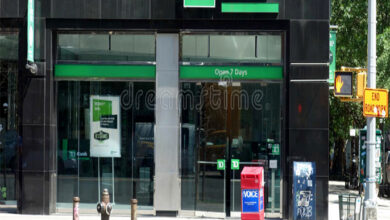Potential Analysis: US Regional Banks May Consider Selling Commercial Property Loans due to Overexposure

Regional Banks in the US Could Consider Selling Commercial Property Loans Amid Overexposure
New data and market sources suggest that many regional banks in the US may need to contemplate selling commercial real estate (CRE) loans at a significant discount after surpassing crucial regulatory thresholds for exposure to the troubled sector.
As the primary lenders to the struggling US CRE and construction markets, regional banks have been reducing their involvement in the sector by implementing stricter standards and issuing fewer loans, particularly after the recent collapses of Silicon Valley Bank, Signature Bank, and First Republic Bank.
This tightening of lending practices is a response to real estate borrowers facing challenges in meeting interest payments amidst rising interest rates, declining office use, and concerns about property values declining due to economic recessions.
However, previously undisclosed data from New York-based real estate data provider Trepp, shared with Reuters, reveals that many regional banks’ holdings exceed the thresholds established by regulators.
According to guidance issued by the Federal Deposit Insurance Corporation and other regulators in 2006, banks with CRE or construction loan holdings exceeding 300% and 100% of their total capital, respectively, should anticipate heightened regulatory scrutiny.
Trepp’s analysis of public regulatory data from 4,760 banks, published on Tuesday, indicates that 763 banks have exceeded these concentration ratios for either CRE or construction loans.
Among banks with assets ranging from $1 billion to $10 billion, 30% have surpassed at least one ratio, while the same is true for 23% of banks with assets ranging from $10 billion to $50 billion.
Although larger banks have recently voiced concerns about their CRE exposure, the new Trepp data highlights the severity and widespread nature of the issue across the banking sector.
Stephen Buschbom, Trepp’s research director, suggests that banks exceeding these concentration ratios are likely to face hesitancy in continuing to lend given the current concerns about CRE. Moreover, breaching these thresholds and having a portfolio of risky loans could pose liquidity and credit concerns for the banks.
The regulatory guidance stipulates that banks exceeding these thresholds should implement heightened risk management practices, including potential sales of specific loans.
According to Trepp data, PacWest, which announced its consideration of a potential sale on May 3, surpassed both the CRE and construction loan thresholds in the first quarter, with ratios of 328% and 126%, respectively.
Additionally, New York Community Bancorp and Flagstar Bank were among the top five banks listed by Trepp that exceeded the CRE loan threshold. Although the banks merged in December last year, they continue to report their finances separately.
Other banks such as Valley National Bancorp, East West Bank, Synovus Bank, Western Alliance Bank, CIBC Bancorp USA, and M&T Bank had elevated ratios that did not surpass the thresholds, according to additional data shared by Trepp.
While Western Alliance and Valley National declined to comment, the other lenders did not respond to comment requests.
During congressional testimony on Tuesday, FDIC chair Martin Gruenberg warned that CRE loan portfolios could face challenges if market conditions persist.
Banks exposed to the CRE sector may reduce their lending to allow their existing CRE debt to mature. In extreme cases, they may even divest portions or the entirety of their existing loan portfolios, as suggested by guidelines and analysts.
Given the reduction in physical office space by tenants and the resulting increase in supply, downward pressure on rents, and the current banking crisis, regional banks might seek to remove commercial real estate loans from their balance sheets.
JPMorgan stated in a March report that it expects approximately 21% of outstanding office loans in commercial mortgage-backed securities to eventually default.
Sellers of these loans may face limited interest and could be forced to accept losses on the assets, warns Ben Miller, co-founder and CEO of alternative investment platform Fundrise.





